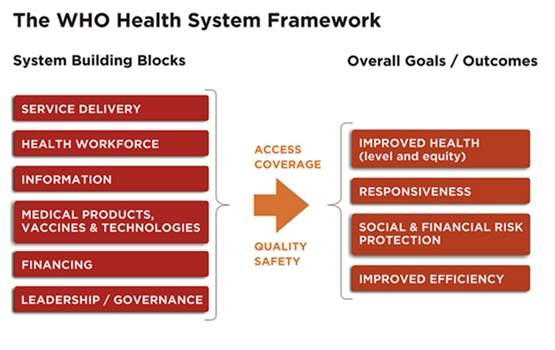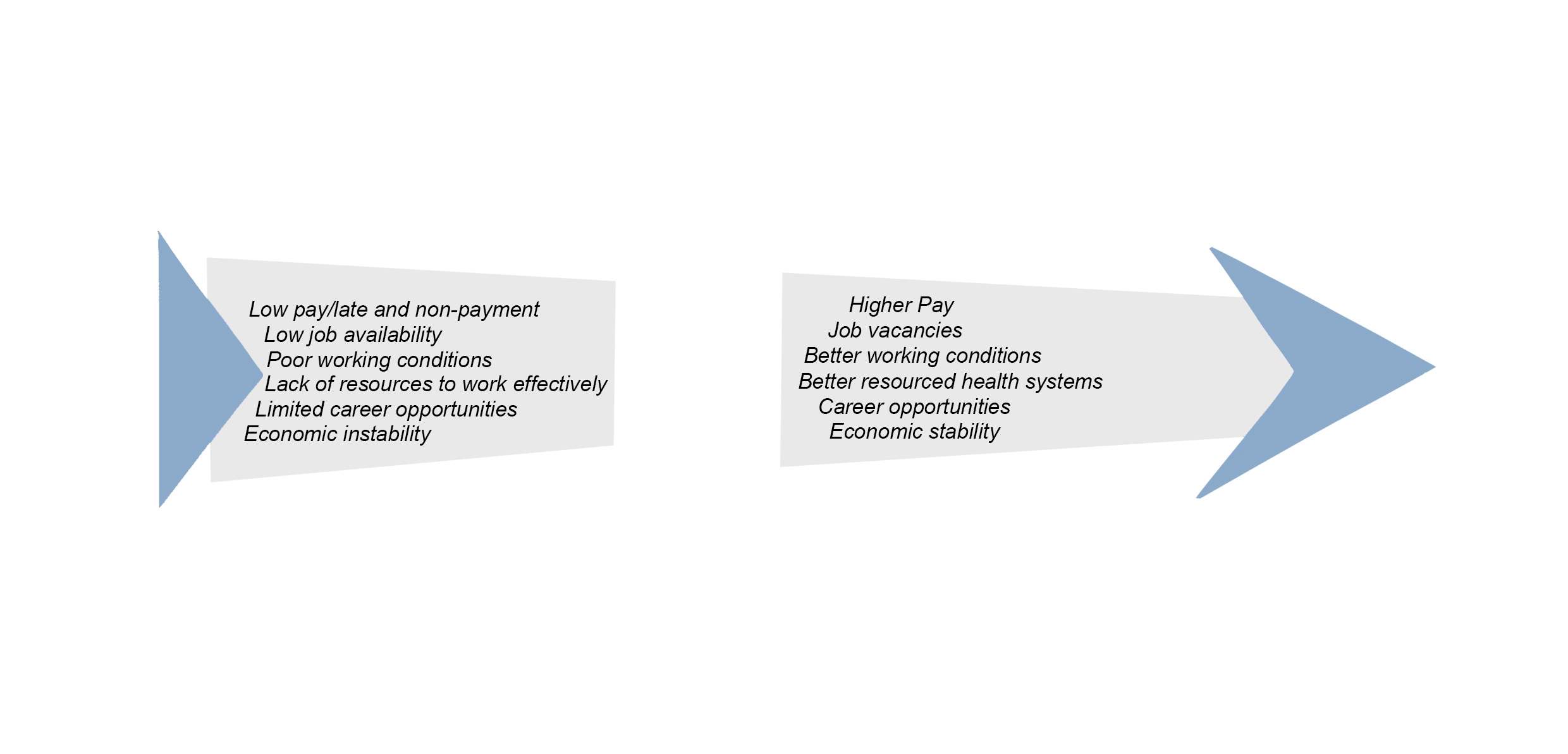Migration of Health Workers from Ghana
| ✅ Paper Type: Free Essay | ✅ Subject: International Studies |
| ✅ Wordcount: 1497 words | ✅ Published: 23 Sep 2019 |
Migration of Health Workers from Ghana – Are financial incentives enough to stem the tide?
BACKGROUND
International migration of health workers is “the movement of health workers, who temporarily or permanently settle abroad, mainly because of problems in their home country1.” This is a prevalent issue in Ghana where health workers move to high-income countries leaving behind the few in an already overburdened system. Health workers are an integral component of any healthcare system and are relevant to all the other blocks of the health sector2,3. They contribute to achieving the overall goals as mentioned in the WHO health system framework (shown in Figure 1).
In Ghana, the majority of the health professionals are known to migrate to the United Kingdom, the United States of America and a few to Canada, South Africa and Saudi Arabia4(p9). A study conducted by Duvivier et al in 2017 showed Ghana as part of the top four African countries that contributed 86.0% of all African educated international medical graduates in the United States of America5(p3).
Globalization plays a role in the subject of migration; however, there are intrinsic problems in the Ghanaian health care system that act as “push factors” for this ever-present conundrum and real benefits in high-income countries that act as “pull factors.” (Figure 2)

Figure 1 WHO Health System Framework, 20072
THE MIRAGE OF FINANCIAL INCENTIVES
In 2006, the Ghanaian government introduced a new pay structure for public health workers, which increased the salaries of nurses and doctors5(p104). In spite of this, doctors have over the years continued to go on strikes demanding increases in salary and more recently, for improvement in their conditions of service6. The health system of Ghana cannot match salaries earned in receiving countries, given that, “the income gradient between home and receiving countries could be as much as twenty-two times in the case of nurses from Ghana.7(p9)”
Willis-Shattuck et al8 found in their systematic review that in developing countries “financial incentives alone was not enough” to influence the decision of health workers to remain in their home country. Many other essential factors were significantly present in the study such as adequate resources, appropriate infrastructure, career development, and management issues. This editorial thus seeks to explore a few of these and their effects on migration.

Figure 2 Some Push and Pull factors for migration Source 9
OTHER FOCUS AREAS
Firstly, there is an urgent need for provision, upgrading, and expansion of the physical resources available for work – adequate and high technology equipment for the size and needs of the facility, medicines, vaccines, beds, ambulances and basic supplies such as gloves, alcohol rub, and disinfectants. We find that in such a low resource setting, though there may be many skilled professionals, these resources needed to work may either be absent or broken down. For instance in the largest public referral teaching hospital in the capital city, Accra, it is often the case that the CT or MRI scans are broken down or undergoing repairs10. It is a situation that is prevalent in many other public health facilities across the nation. Doctors struggle to make clinical decisions with limited resources and are left helpless in some circumstances, limiting their capacity to contribute to the achievement of the health goals.
In parallel with this is the need for improvement in working conditions. With the poor work environments and conditions in these facilities; absent or crowded restrooms for physicians and nurses, consulting rooms with no air conditioning, damaged and worn out furniture, health professionals can quickly become disillusioned with the entire health system. All these together lead to frustration, low morale, and a constant feeling of being underutilized. In such circumstances, health workers tend to seek a way out into other health systems in other countries, which offer better resources and working conditions, which invariably lead to job satisfaction and a general feeling of effectiveness. As stewards of the health system, the government needs to strengthen oversight over its resources to ensure its proper management.
Secondly, attention must be drawn to creating and increasing capacity for opportunities in career advancement and education. This process seems to be much easier in receiving countries thereby making it a significant pull factor. In developed countries, there are more vacancies, laid out pathways for advancement and a system devoid of needless bureaucracy, nepotism and corruption9(p10). The health ministry, in conjunction with other sectors such as the education ministry, can restructure postgraduate training for nurses and doctors in a way to reduce waiting times to get into programs by increasing the number of facilities accredited to offer training in both rural and urban areas. “Task shifting” is another means to improve retention. In developed countries, such as the United Kingdom nurse practitioner roles were created to increase the health workforce11 and consequently, allowing them to retain more nurses by offering them an opportunity to have new skills.
When such opportunities are available, nurses and doctors are able to satisfy their need for personal achievement8. This is relevant to improving satisfaction levels and ultimately encouraging retention.
Thirdly, the reality is, “migration is a symptom and not the primary disease”12 of the issues in the health system and thus the government needs to restructure the governance of the health system. The government, through the Ministry of Health, is the steward of the health system and therefore responsible for ensuring that the health system ultimately achieves its goals – of which the health worker plays a crucial role.
It is challenging to work in a system with poor oversight and guidance, minimal regulation, accountability, and transparency. Without these, health workers will not have confidence in their system and this leads to job dissatisfaction.
Ghana has a normative model of governance, which tends to dissociate policymakers from the frontline actors in health care delivery. There is a need to include doctors, nurses and other health workers or their legitimate representative to participate in aspects of regulation and monitoring in the health system to improve levels of trust and accountability.
There is also a lack of adequate supervision at the micro and macro level of the health system which studies show lead to low morale and demotivation in health workers8(p5).
Robust governance will lead to good management of the budget for the health system, which will ultimately lead to the strengthening of the system to address the other areas of concern mentioned above.
Lastly, non – financial incentives could prove to help mitigate migration if equitably available to all health workers. These include free health care in public hospitals for health workers, their spouses, and children (below a certain age), provision of housing, unpaid holidays, flexible working hours, sabbatical/study leave, occupational health counselling and recreational facilities13.
CONCLUSION
Ghana as a low-middle income country has challenges in resource creation resulting in strong “push” factors in the health system making it unable to stop migration completely.
We already know that financial incentives are able to offer improvement in retention, however, it is not clear how sustainable its benefits are14. Therefore, the Ghanaian government must put in place strategies to begin to address the provision of adequate resources, improvement in working conditions, opportunities for career advancement, robust governance and the introduction of more non-financial incentives to further encourage a sustainable decline in migration trends.
References:
- Diallo K. Data on the migration of health-care workers: sources, uses, and challenges. Bull World Health Organ. 2004;82:601-607. doi:10.1590/S0042-96862004000800010
- World Health Organization. Everybody’s Business: Strengthening Health Systems to Improve Health Outcomes : WHO’s Frmaework for Action. Geneva: World Health Organization; 2007.
- Anand S, Bärnighausen T. Health workers at the core of the health system: Framework and research issues. Health Policy. 2012;105(2-3):185-191. doi:10.1016/j.healthpol.2011.10.012
- Librarian I. Migration by Graduates of the University of Ghana Medical School: a Preliminary Rapid Appraisal. https://www.hrhresourcecenter.org/node/1744.html. Accessed February 17, 2019.
- Antwi J, Phillips DC. Wages and health worker retention: Evidence from public sector wage reforms in Ghana. Journal of Development Economics. 2013;102:101-115. doi:10.1016/j.jdeveco.2012.10.004
- Gov’t concludes Condition of Service for doctors – The Ghanaian Times. http://www.ghanaiantimes.com.gh/govt-concludes-condition-of-service-for-doctors/. Accessed February 17, 2019.
- Dovlo D. The Brain Drain in Africa: An Emerging Challenge to Health Professionals’ Education. 2004;2(3):18.
- Willis-Shattuck M, Bidwell P, Thomas S, Wyness L, Blaauw D, Ditlopo P. Motivation and retention of health workers in developing countries: a systematic review. BMC Health Serv Res. 2008;8:247. doi:10.1186/1472-6963-8-247
- Dovlo – 2004 – The Brain Drain in Africa An Emerging Challenge t.pdf. http://www.harep.org/Agriculture/02-dovlo.pdf. Accessed February 3, 2019.
- Yusif F. ’Broken down MRI machines my major concern’- Agyeman Manu. citifmonline.com. http://citifmonline.com/2018/02/21/broken-down-mri-machines-my-major-concern-agyeman-manu/. Published February 21, 2018. Accessed February 14, 2019.
- task_shifting_booklet.pdf. https://www.who.int/healthsystems/task_shifting_booklet.pdf. Accessed February 19, 2019.
- Kingma M. International Migration of Nurses: Issues and Strategies. :16.
- Dambisya YM. A review of non-financial incentives for health worker retention in east and southern Africa. 2007:72.
- Mackey TK, Liang BA. Restructuring brain drain: strengthening governance and financing for health worker migration. Glob Health Action. 2013;6. doi:10.3402/gha.v6i0.19923
Cite This Work
To export a reference to this article please select a referencing stye below:
Related Services
View allDMCA / Removal Request
If you are the original writer of this essay and no longer wish to have your work published on UKEssays.com then please click the following link to email our support team:
Request essay removal


